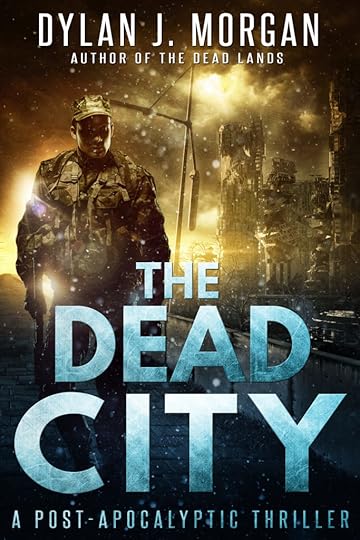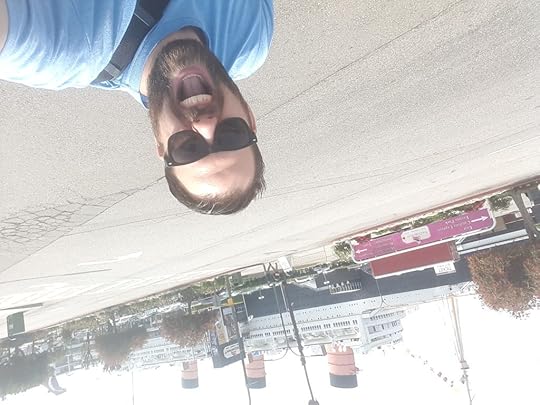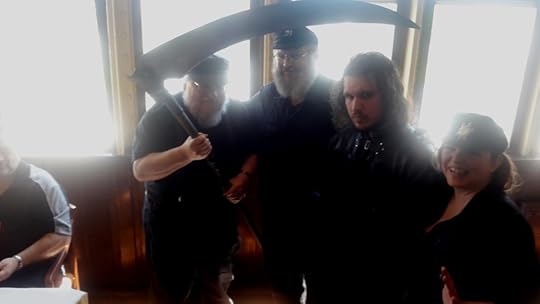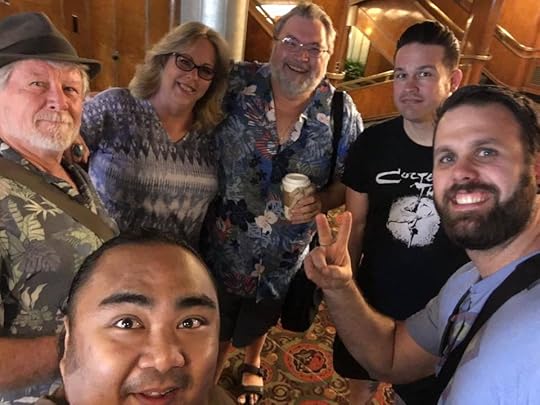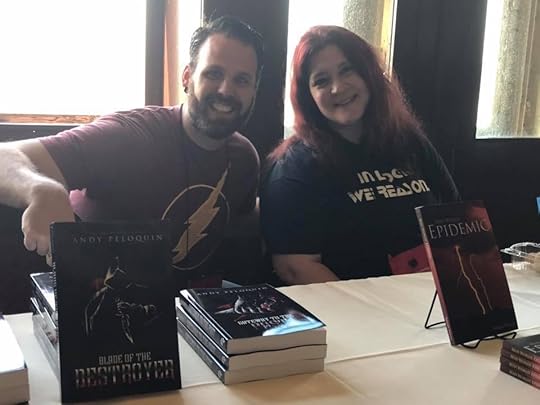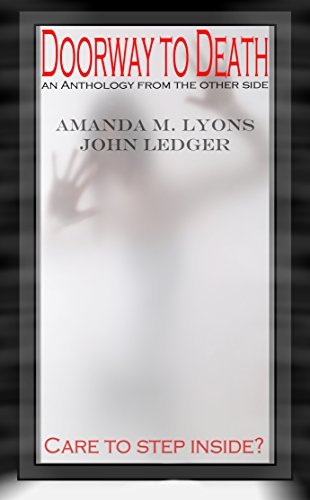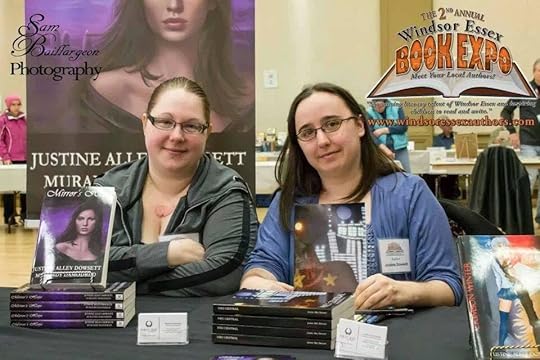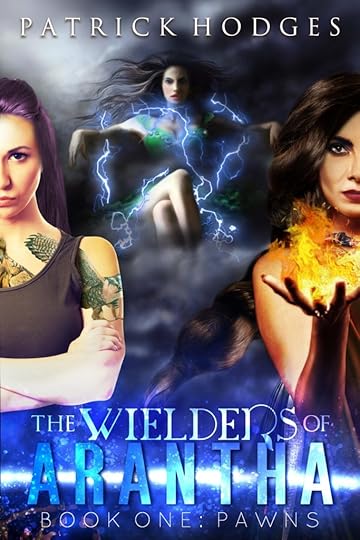Andy Peloquin's Blog, page 15
May 5, 2017
Everyone Has a Unique Sense of Smell
One thing I’ve found about the best books is that the writing engages ALL the senses. You’ll read about the sights, sounds, sensations, tastes, and even the smells of the location where the book is set. Using these senses helps to draw the reader into the book and makes it more compelling.
In The Last Bucelarii series, the Hunter of Voramis (the protagonist) is a half-demon assassin with heightened senses. In addition to keen hearing, he has a strong sense of smell (a very animalistic trait, a part of his demonic heritage). Smell plays a very large role in the story. Not only does it help to set the tone for his environment (the heady floral perfumes of the nobility, the musky stink of working men, the rotting stench of the demons, and so on), but it also enhances the way he perceives the people around him.
Some examples:
He has memories of his “lost love”, and the memories include her scent: jasmine and honey, cinnamon and berries.
The children (Farida, Hailen, etc.) have a “clean, innocent” smell.
The men he bonds with tend to have honest, hard-working smells (leather, sweat, horses, etc.)
The scholars smell of ink, parchment, leather, dust, vellum, etc.
The demons reek of rot and decay.
His sense of smell is much stronger, like an animal’s.
Through the books, he travels from the city of Voramis (far in the south) northward. He goes from his medieval Europe-style city to cities with more Arabian, Mediterranean, and Oriental environments. Each new city exposes him to a different array of smells, just as it would be in the modern world.
Here’s an interesting fact I found today: the scent receptors in animals’ noses develop according to the scents to which they are exposed.
There are 1000+ olfactory receptors, making the olfactory system the most complex of the senses. Genetics do play a role in the sense of smell—the genes of the mice determined which olfactory receptors were present. However, the most important factor was the environment. Mice which grew up under laboratory conditions had a different sense of smell from genetically similar mice that grew up outside a lab.
Think about it like this: every country/city/environment has their own unique blend of scents. A Brazilian growing up in the U.S. would have a sense of smell more on par with an American than a Brazilian on the streets of Rio. The same would be true in Mexico City, Tokyo, or Riyadh.
A fascinating concept, isn’t it? Had the Hunter spent his life living in an Oriental-style city, he’d be accustomed to a totally different range of scents. The same if he’d grown up in a Viking-style city, an Arabian-style city, or a hut in the jungle.
The sense of smell is conditioned by our environment as well as our genetics. Perhaps that’s why a scent that smells nice to one person is repulsive to another, and vice versa.
The post Everyone Has a Unique Sense of Smell appeared first on Andy Peloquin.
May 3, 2017
Book Review: The Dead City by Dylan J Morgan
For Book Review Wednesday, I’ve got something out of the ordinary for me: a post-apocalyptic military thriller. Think Resident Evil meets Alien meets the Special Forces. All in all, one heck of a book!
The Dead City
Nuclear war devastated the planet of Hemera and shattered its main city, Magna. A century later, its sister planet, Erebus, despatched a team of soldiers to the city to rescue Hemera’s president and restore that world to its former glory. What the reconnaissance team found however was a violent mutated population—all they discovered there was death. Now, four weeks after the final mayday call from her decimated soldiers, Erebus has sent a larger force to Hemera’s surface. Colonel Paden is coming with them, but his desires go way beyond the rescue of the surviving recon team. A mountain of jewels and gold is rumoured to lie buried beneath the presidential palace, and Paden is here to claim the wealth he believes is due to him.
Dropped into an unforgiving world, Ryan and the other soldiers of Erebus Superior Armed Forces soon discover everything is not as they thought. Magna’s population is more deadly than they could ever have imagined, their Colonel more corrupt than they’d ever known. Seeking refuge in the president’s underground bunker, the combatants are forced to sacrifice everything just to stay alive.
Bandit clans control Hemera’s dead lands and they’ve surrounded Magna in an effort to claim the fortune that belongs to their planet. Mutants control the city streets, but all they want is the taste of human flesh. Trapped inside the dead city, Ryan must fight against a mutated population—against the greed, betrayal, and hatred of those who stand at his side—in a desperate battle for survival.
My Review: 5 Stars
While post-apoc military thrillers aren’t my usual cup of tea, I found this one heck of a compelling read. I was given this book in exchange for an honest review and have to say it was absolutely one worth reading.
The story is mostly fast-paced and compelling, with only a few slow moments throughout. The zombies/mutants weren’t too clearly described, but it was enough to know they were dangerous. Of course, the HUMAN antagonists were the truly interesting ones. By the climax of the book, I was only too glad to see them get their come-uppance. I haven’t disliked antagonists so strongly in a long time.
The book is dark and grim and vicious and bloody and brilliant. Definitely one I’d recommend to anyone!
About the Author
Dylan J. Morgan is the author of five novels, four novellas, and a short story collection, all in the field of horror and post-apocalyptic fiction. Now living and working in Norway, he was born in New Zealand and raised in the United Kingdom. He writes during those rare quiet moments amid a hectic family life: after dark, with limited sustenance, and when his creative essence is plagued the most by tormented visions. If you’re searching for that light at the end of the tunnel then stop looking—you won’t find it here.
Find the book on Amazon: https://www.amazon.com/dp/B01LDT7F2M/
https://www.goodreads.com/book/show/31329015-the-dead-city
The post Book Review: The Dead City by Dylan J Morgan appeared first on Andy Peloquin.
May 1, 2017
My StokerCon Experience
I spent this last weekend at StokerCon, a convention organized by the Horror Writers Association, held on The Queen Mary in Long Beach, California.
The convention was very much focused on writers, with daily workshops, panels, discussions, and even pitch sessions for horror writers. I, however, went as a volunteer, meaning I was coordinating the Dealer’s Room (where the vendors set up tables).
Highlights of the Weekend:
– OF COURSE, getting to meet the one and only George R.R. Martin himself.

I was fortunate enough to be roped into serving as the Kevin Costner to his Whitney Houston. Thankfully, there was no need for me to dive in front of a bullet or throw any screaming fans overboard. However, I had the chance to take a private tour of The Queen Mary with him and a few other guests.
– I also got the chance to talk to Chuck Wendig, creator behind the Terrible Minds blog, the latest Star Wars novels, and more. I made the foolish mistake of thinking he was Max Brooks, the author of the Zombie Survival Guide. Thankfully, he’s a cool guy who only hated me A LITTLE for that. Hehe.
My fellow San Diego HWA members also joined in on the fun.
I spent most of the three days I attended on call around the Dealer’s Room, available if something needed to be moved (people seem to think I’m good at that). It was nice to interact with other writers, listen in on a few discussions, and even get a bit of writing work done. Bonus: I got to set up and sell a few books.
All in all, one heck of a weekend! Major props to Kevin Wetmore, Kate Jonez, Lisa Morton, and all the other amazing Horror Writers Association people for making it a whole lot of fun.
The post My StokerCon Experience appeared first on Andy Peloquin.
April 26, 2017
Book Review: Doorway to Death Anthology by JEA
For today’s Book Review Wednesday, I’m posting my review of a short story anthology published by J. Ellington Ashton Press (the publisher of my The Last Bucelarii series). I’d say it’s definitely worth reading!
Doorway to Death
The doorway stands beyond man, at the end of a long hallway filled with sights beyond reason. It is a place where the universe begins and ends, where we begin and end, and deep down within our hearts, where we keep our secrets and imagine our stories, it lives there too. Come, join us at the Doorway to Death, enter and claim your end!
From the minds of Essel Pratt, Toneye Eyenot, Roy C. Booth, Axel Kohagan, Kent Hill, Michael Fisher, Coralie Rowe, Brian Barr, Lemmy Rushmore, Michael Noe, D.S. Scott, Kevin Candela, Jeff O’Brien, Magenta Nero, Howard Carlyle, Ts Woolard, Dani Brown, Magan Rodriguez, Jim Goforth, Alice J. Black, Dona Fox, and Brian Glossup
My Review: 5 Stars
I received this book in exchange for an honest review. I’m not usually a short story collection/anthology reader, but I found this one a pretty fascinating read. Some of the stories were light-hearted and amusing, others cynical and cutting, and still others chilling and creepy. Not every story was perfect, but I enjoyed most of them.
What I liked best about this collection was that the stories were fairly short. As a busy person with limited time to read, it was nice to pick it up and get through a story or two at a time. The shorts held my attention and kept me turning pages, so it’s a collection I’d recommend to anyone.
Here’s a Taste:
There were no lights on in the nursery when the new family arrived home, and the altar that covered the gigantic pentagram on the floor would have to be moved before the ritual. Laura entered the house carrying her newborn twins tightly to herself. She went straight to the boys’ room and tucked Josh into his cradle. He was fast asleep and rolled over on his side immediately, dead to the world. His brother, Sean, who was literally dead to this world, was tucked away in his cradle by mom. She lit the candles that lined the walls. Their flames flickered, then brightened as a sense of ancient magical presence was growing within the confinements of the little nursery.
Preparations for the ritual would have to be made now. Laura knew the rules of the Black Arts. There were books upon books about them. She owned many. What she hadn’t learned from the countless tomes she obtained throughout her life was taught by an elder in the coven she was once a part of. Many lost rites were passed down to her. Everything from incantations to summoning of good luck demons who would grant any wish you so desired. Her witchmother claimed Laura was her best student. In time she was surpassed, and lost her value to the young pupil. At twenty one Laura became witchmother to her own coven of witches and a self proclaimed prodigy.
First, she must purify her body, starting with a hot bath and her prescription of placenta pills. It was time to begin her ritual regime.
Laura undressed in her bedroom, watching her body move in the vanity’s mirror. Slithering out of the wrinkled, stretchy maternity pants and removing the hospital gown she hadn’t bothered to change from for the ride home. Pulling the soft, velvet chair out from the vanity, she sits, placing her medications and baby bag next to her socked feet. There is a silver hair brush in the drawer that she brushes her hair with. She does this for an hour, one thousand strokes and no less. Placing the brush back in the vanity’s drawer, she takes a painkiller and a placenta pill, chasing it with the last glass of blood wine she had been saving for such an occasion.
In the stone worked bathroom of the home, Laura has a claw foot tub, centered directly over the drain in the middle of the room. A pump was attached to a rise in the rock floor, and hoses and tubes ran from it to the tub. The hot bath must be prepared before the ritual as well as her body. She enters the room and clicks the on switch to the pump. The motor buzzes, then begins pumping hot water and a mixture of illegally obtained amniotic fluids and nutrients into the tub. Once it was filled to her desire, Laura removes her socks and climbs into the sparkling potion to relax.
There were memories cascading through the dim lit stone decorated bathroom and Laura was drifting, calming herself into a trance-like state. She could feel the pills in her system, as they were absorbed by her craving body, feeding on their giving selves. Their nourishing matter mending all the broken parts, the stretched pains and pulls of the skin, healing the body, carrying it, lifting it.
There was a subtle invasion on all sides of her, beginning with a sound, and Laura listened, slowly rising through her senses. In her ears. On her skin. In her mouth. Through every cell within her wholeness, she could felt it with her soul.
“Mommy….” It said.
In an instant the pool of warm amniotic fluid quivered and held her motionless for what only measured eternity in Laura’s mind. She saw the slow swell in breasts and spirits as a dark realm arose. With her eyelids bleeding, split at the corners, and being peeling away from her field of vision, forcing her to witness the ghost of her dead son, Sean.
“Mommy….” It repeated in a whine, deep and guttural with death. It was doubled; the word was, almost like an immediate repeat, or a shadow of itself. The noise along with its own scent of decay, trailing. The eerie, shrill pitch was a continuous buzz in Laura’s head.”….Mommy.” It growled quietly.
The hold was unbreakable. Lifting Laura up out of the tub, fluid webs pouring around her body, flowing in some uncoordinated, contained manner. Not one drop spilling to the stone tiled floor, nor a splash, nor mist. There was intellect in this gathering of electrolytes and urea and proteins. This was an old entity, one that has existed in this realm, and many others. Long before man was even a glimmer in his God’s eyes, long before anything was, for that matter.
Laura was floating in a hardening amniotic sac, which was rotating around her like the universe to the sun, in an eternal continuation of the dance of life and death. And her Dead fetus Sean was speaking to her from between the worlds, from the jar of formaldehyde gel in his vacant crib, to the Dead Realm.
“Mommy…..you know what you musssst do.” Dead fetus Sean whispered, detached and dryly. The rising and falling of its ghastly words were almost unintelligible, but Laura knew what they meant, understood them clearly. She could hear her dead son’s thoughts. Feel his presence. “You musssst perform the ritual soon. Your doorway will clossssse within the day.” It gurgled from the crib.
“I know, my son.” She told him. “The preparation must be completed first. Then I will begin the ritual, and be with you both soon.” Laura was in tears. “I love you, Sean. You and Josh. I will not live without either of you this time!”
For more information:
Visit the publisher’s website (http://www.jellingtonashton.com/) to read about the authors contributing to the anthology.
Find the book on Amazon: https://www.amazon.com/dp/B015VLG1GY/
The post Book Review: Doorway to Death Anthology by JEA appeared first on Andy Peloquin.
April 24, 2017
Why Are We So Violent?
Here’s a pretty terrifying fact: the rate of lethal violence among humans is 7 times higher than among other mammals. Of more than 1000 species studied, humans were the ones most predisposed to violence—not only to other species (prey/food), but to each other. Humans are the only species to not only kill each other, but to constantly innovate and create new ways to do so.
One psychologist published this in 2016:
“Our violence operates far outside the bounds of any other species. Human beings kill anything. Slaughter is a defining behavior of our species. We kill all other creatures, and we kill our own. Read today’s paper. Read yesterday’s, or read tomorrow’s. The enormous industry of print and broadcast journalism serves predominantly to document our killing. Violence exists in the animal world, of course, but on a far different scale. ”
“Carnivores kill for food; we kill our family members, our children, our parents, our spouses, our brothers and sisters, our cousins and in-laws. We kill strangers. We kill people who are different from us, in appearance, beliefs, race, and social status. We kill ourselves in suicide. We kill for advantage and for revenge, we kill for entertainment: the Roman Coliseum, drive-by shootings, bullfights, hunting and fishing, animal roadkill in an instantaneous reflex for sport. We kill friends, rivals, coworkers, and classmates. Children kill children, in school and on the playground. Grandparents, parents, fathers, mothers–all kill and all of them are the targets of killing…”
(Source: R. Douglas Fields, Why We Snap, p. 286, 2016.)
Pretty scary, isn’t it? So what’s causing it? Why are humans so much more violent than other creatures, even predators?
Territoriality – Primates are among the most territorial mammals on the planet, and humans are no exceptions. We have an innate need to protect “our land”. Why else do you think countries, nationalities, and territories exist in the first place? We humans have a need to “drawn a line in the sand” to mark our territory. When someone else crosses that line, violence is our instinctive reaction.
Conscious Awareness – Our intelligence and consciousness is actually one of the primary contributors to our violent tendencies. We can think beyond our basic survival needs, but that consciousness leads to violence for a broad number of reasons (personal offense, territorial disputes, entertainment, etc.).
Tight Living Environment – Too many people living close together is a breeding ground for violence. The territorial nature of humans increases the chance of violence should someone “cross that line” of our property. The fact that we’re packed so tightly together means there’s less space for us to inhabit and a greater risk someone will cross that line.
Easy Access to Weapons – Bears only have their teeth and claws, elephants only have their tusks and trunks. Humans have access to THOUSANDS of weapons (all of which we created thanks to our conscious awareness) which make it easier than ever to kill.
Freedom – Hard to believe this is true, but it absolutely is. State-run societies intended to suppress violence tend to lead to lower crime rates, but the “freedom” common in modern governments places emphasis on personal choice/decision-making. Given humans’ tendency toward violence, it’s very likely the freedoms are a contributing factor in the higher violence rates.
These are the primary factors that have led to higher incidences of violence among human, but there are HUNDREDS of tiny things that contribute as well.
The post Why Are We So Violent? appeared first on Andy Peloquin.
April 20, 2017
Guest Post: Planning for Pantsers
Today I’ve got a special guest post written on the HIGHLY controversial topic of planning vs. pantsing/gardening vs. architecture. Basically, some people (like me) tend to take a more structured, outlined approach to novels, while others prefer to sit down and let the story flow as they write.
Let’s be clear: it’s impossible to say which of the two is better. Some people insist that pantsing allows for more creativity, while others believe that planning leads to a more cohesive story. I’m firmly in the second camp but recognize that pantsing has its benefits.
But my guest author, Justine Alley Dowsett, found a way to put the two together in a way that seems to be highly effective for her story. Read about her method below:
Planning for Pantsers by Justine Alley Dowsett
I’m a pantser. What does that mean? It means that I’d rather ‘write by the seat of my pants’ than plan anything beforehand. However, with my latest book Uncharted, written with my co-writer Murandy Damodred, we did more planning than I’m used to and I think it helped us.
Making Notes:
Since Murandy and I co-write, we use Google Drive to keep everything straight. If you’re not familiar with Google Drive or Google Docs, it’s an open platform where you can share your documents and multiple accounts can work on the same document at the same time. It also serves as a cloud drive, so your work is saved and backed up automatically and anyone you give access to the files can open them up and work on them. This helped us with planning because while writing we always had access to our notes file, which became a living document, changing as the story expanded.
Setting and Worldbuilding:
Usually I do a lot of the world building in my own head, but since Uncharted is an adventure story that takes place in a variety of settings and cultures, I made a point of writing down a handful of things to keep in mind about the settings, so I would make sure to include them.
Characters:
This is where the planning really came in handy. Before we started writing, Murandy and I wrote out detailed backstories for each of our main characters and at least a sentence or two about our minor characters as we invented them. This helped to flesh everyone out and make sure we knew where they had come from and what was important to them because of that.
Plot:
This is where our best of intentions sort of fell apart, but in a good way. Before we started writing, we formed a point form list of plot points then we proceeded to ignore them. As we wrote, we went back and added new plot points to our list and kept adding to that list to stay a few steps ahead of the story, but ultimately this was a form of pantsing more than planning.
Editing:
Where the notes really came in handy was when I went to write the second draft. All throughout the first draft, instead of going back and fixing things that needed changing, I took notes instead. Then, when I went over the finished first draft, I applied the changes or checked for the problems I’d indicated. It saved me a ton of time and it also meant that Murandy and I could write quickly, without feeling like we were making a mess of things.
All in all, if you’re a pantser, like me, I suggest trying to apply some planning to your process just to see what you can learn. And if you’re a planner, take a risk and try a little pantsing!
Justine actually has a new book, released April 17th:
Uncharted
Fated to be a Priestess of Saegard, Meredith dreams of leading a normal life with a family and a home of her own, something she’ll never have if she swears her life to the Order. A chance encounter with a stranger in the sacred Celestial Chamber sends her previously well-ordered life into a tailspin of adventure and mayhem as she is blamed for the theft of a legendary artifact.
Now a fugitive, Meredith must join forces with Captain Reginald Lawrence, the son of the man who initially brought her to the Temple, and his enigmatic business partner, the charming yet at times infuriating, Grey Rhodes, to find the Celestial Bowl and clear her name. From the cosmopolitan capital of Saegard to the coast of Ismera and back again, Meredith’s journey will reveal the true nature of her past, present, and ultimately, her future.
Here’s a Taste:
The door to her ‘room’ on The Clover was just as she remembered it, although it seemed much smaller now that she was older. No larger than a water closet, the addition on the backside of the Captain’s Quarters that had been built for her was still there as though, after all this time, it was waiting for her return.
Reaching for the small brass ring that served as a handle, Meredith pulled the half-sized door open and was dismayed to find that there was no way she’d fit inside the small space. It was filled to the brim with all manner of junk. Tackle boxes, rope, a crate filled with empty bottles, and a pile of soiled linen; her ‘bedroom’ had been repurposed into the ship’s dumping ground.
This is my room. For no reason that she could fully articulate, Meredith felt indignant. Even if it’s been more than ten years, it was built for me and I’m taking it back! The irrational desire to re-stake her claim on something that hadn’t been hers for a decade took over and she grabbed the nearest thing to her and turned with purpose, ready to hoist a crate filled with empty liquor bottles over the railing and into the water below.
“Whoa, hold on just a minute!” Captain Laurent’s son grabbed hold of her arm before she could gain the height she needed to throw the crate overboard.
His noble friend, minus his navy suit jacket now, stood just behind him, almost as if staying out of her range. His white shirt was nearly clean, though she could see where brownish grey stew coloured the frills of his collar. Meredith felt only slightly guilty about her little ‘outburst’. He deserved it…he’s a jerk.
“No,” she stated, imploring him to listen, “you destroyed my room and I’m taking it back. It’s the only home I ever really had.”
“Your…room?” A light went on behind the young Captain’s eyes. “That’s why it had a bed in there…I always thought it was a dog house. Didn’t know why my dad would’ve wanted a dog aboard a ship, but he was always doing all sorts of foolish things.”
“Like taking in strays?” Meredith demanded, arching a brow disdainfully in his direction. “Is that what you’re implying?”
“Ah, no!” Reginald’s eyes went wide, his hands going up in a defensive fashion. “No, of course not! My dad was always winning strange sorts of stuff in poker tournaments. He was gambler.”
“Are you now implying that I was bought or won in a card game, like some sort of…child slave?”
His eyes bugged even further out of his head, if that was possible, and his cheeks flushed. “Ah…no…I mean…you weren’t, were you?”
“Of course not!”
“So now that we’ve established that you aren’t a stray dog or a child slave,” the noble interjected in a no-nonsense tone of voice, his grey eyes dark, “do you mind telling us who you are and what you’re doing here?”
Meredith fought the urge to laugh because the bit of mushy carrot in his hair was so at odds with his expression.
“I am here because I need passage out of Saegard. I fell in the water, got drenched, then walked here during the night. I was cold, wet, and badly bruised…from my fall. No one was around on deck, so I thought I would warm up inside. I took my clothes off to dry so I wouldn’t catch a cold and I used the silks because they were all I could find. That’s when I fell asleep. And I would have told you all of that, if you weren’t being such a jerk!”
About the Authors:
Justine Alley Dowsett
From obtaining her BA in Drama at the University of Windsor to becoming an entrepreneur in video game production and later, publishing, Justine Alley Dowsett’s unswerving ambition has always led her to pursue her dreams. She lives in Windsor, Ontario and dedicates her time to writing and publishing fiction novels. When not focusing on growing her business, she enjoys role-playing with friends and developing new ideas to write about.
Murandy Damodred
With a background in Drama and Communications from the University of Windsor, Murandy Damodred enjoys fantasy fiction with strong romantic subplots. She is an avid role-player and is happiest when living vicariously through her characters. Though she’d rather think of herself as the heroine of her next novel, in the real world she is an expert in sales and management living in Windsor, Ontario.
The post Guest Post: Planning for Pantsers appeared first on Andy Peloquin.
April 19, 2017
Book Review: Pawns by Patrick Hodges
It’s Book Review Wednesday, and I’ve got a treat: a Sci-Fan (Science Fiction blended with Fantasy) novel written by an awesome author I met and befriended at last year’s InD’Scribe Convention. It’s my first proper introduction to the SciFan genre and I’m happy to say I’m hooked!
Note: the book will be released tomorrow, April 20th, but it’s up for pre-order!
Pawns (The Wielders of Arantha Book 1)
Seven hundred years in the future, the Jegg – a powerful alien race – invade Earth, wiping out half of the Terran Confederation.
In a hidden base under the Sahara Desert, a team of scientists works to mount a resistance against the invaders. Their plan is to fit an Earth ship with Jegg folding-space technology, and travel to the other side of the galaxy to find a mysterious energy source… one that could help them defeat the Jegg.
But just before departure, catastrophe strikes. Only two of the crew survive and make it to their destination: the team leader’s wife Maeve, and her teenage son Davin. What they find on the distant planet will forever change both the future of their family and their planet, as they enter a race against time… and against impossible odds.
My Review: 5 Stars
I received this book in exchange for an honest review, and I’m very glad I did! This is my first introduction to Sci-Fan and have to say I enjoyed it quite a lot. The blending of magic and technology brings together the two things I love about speculative fiction.
I found this to be a very enjoyable novel, with a solid storyline that kept me reading without losing my interest. There were no parts where the story lagged or got bogged down by unnecessary exposition. Though it took a while to get interesting in the beginning, I was hooked before I hit page 100. It was very easy to read through the story, and I couldn’t wait to hit the climax and find out what the deal was with these magical stones that had called an Earther from across the galaxy.
I LOVED the plot twist (no spoilers) that shows up near the endpoint—totally caught me by surprise. The characters were well-written and easy to understand, even the villains. All in all, a solid book that I will definitely be returning to when the Book 2 is released.
Here’s a Taste:
Voris’s face scrunched up in anger. Turning to the Vandan who’d drawn his sword, he yelled, “Kill him!”
Holding the hilt of his sword with both hands, the man rushed at Mizar, who didn’t move. With a primal scream, the man swung his sword in a wide arc, intent on separating Mizar’s head from his body.
With a quickness belying his age, Mizar ducked under the sword as it sliced through the air. Calling upon his abilities, he directed a powerful bolt of compressed air right at the swordsman’s gut. A moment later, the man was flying backwards, his limbs flailing as he flew past his cohorts. He hit the water of the stream, but didn’t stop there. His body bounced across the surface like a stone being skipped, coming to an abrupt halt when he crashed head-first into a large rock that stuck out of the ground on the other side. There was a sickening crack of bone upon stone, and the man’s head fell limply under the water. It did not rise again. Only his feet and chest protruded above the surface, right next to a large red stain that now decorated the stone.
The stupefied look on the faces of the three men was almost comical. Composing himself, Voris gestured to the two archers, whose bows dangled slackly in their hands. Gibbering with rage, he spluttered, “Shoot him!”
The archers were only ten or so yards away from Mizar. At this close range, anyone with even moderate skill would be able to hit their mark. In one motion, both men raised their bows, pulled back on the drawstrings, and fired.
Mizar only had a second to react as the two arrows split the air on their way to him. With a slight wave of his hands, he changed the flow of air around him, thereby directing the arrows to zip past his head, continuing on their harmless trajectory.
Before they could hit the ground, Mizar turned in the other direction and waved his arms in a circle. As if they’d developed a mind of their own, the arrows changed direction, one banking left and the other right, sweeping around in a wide arc and climbing high into the air.
Mizar whirled around to face the Vandans again, moving his arms in a practiced, precise series of gestures, bending the air to his will. The raiders watched, goggle-eyed, at the arrows that seemed to defy gravity. Mizar thrust his hands forward, and the two arrows decided on a new direction. Before the archers could even react, the arrows embedded themselves in their throats.
Voris’s jaw dropped, his knife hand shaking visibly as he watched the last of his men topple to the ground, blood gushing from their necks and staining the grassy earth.
Satisfied, Mizar affixed Voris with his steeliest glare. “Only you and me now, Vandan.”
Voris didn’t move. He could only croak out a barely intelligible, “Wh-what are ya?”
“I am Mizar, High Mage of Darad.”
About the Author:
I currently live in Arizona with my wife, Vaneza. After years of writing for several different entertainment-related blogs, I have found new life and vitality by writing fictional stories about young teens and preteens that are entertaining for ALL ages.
For me, it’s all about the characters. I love creating characters that jump off the page, that feel like real people no matter how old the reader is. Because without great characters, you really don’t have a great story, do you?
Find the book on Amazon: https://www.amazon.com/dp/B06XSVGV86
Visit Patrick’s website: http://patrickhodgesauthor.com/
Find Patrick on Facebook: https://www.facebook.com/patrickhodgesauthor/
Tweet at him: https://twitter.com/Shrykespeare
The post Book Review: Pawns by Patrick Hodges appeared first on Andy Peloquin.
April 14, 2017
Why I Decided AGAINST Self-Publishing
When I started my author journey (in 2013), I decided that self-publishing my first novel (In the Days) was the right choice. After all, I spent weeks submitting it to various publishers and didn’t hear back. I wanted to put out a book so I could start getting my name recognized.
After publishing the book in March 2014, I set to work on the next book (Blade of the Destroyer). But as I got reviews and feedback for In the Days, I realized a harsh truth: I wasn’t as good a writer as I thought I was. I needed input not just from beta readers and critiquers, but also professional editors adept at finding and eradicating mistakes.
Though it took a few days to swallow my hurt feelings, I set about making Blade of the Destroyer as good as possible. That meant not only going through multiple critiquing rounds, but also various self-editing rounds AND professional editors. By the time the product was completed (November 2014) and ready to shop around to publishers, it was in good shape. After the editors at my publisher J. Ellington Ashton Press finished with it, it was a MUCH better product.
That discovery supported my decision to work with an indie press/small publisher instead of going the route of self-publishing.
Flash forward to today, April 2017: I have four published novels (three of The Last Bucelarii series with J. Ellington Ashton and one of the Queen of Thieves series with Dragonblade Publishing). Four books of learning from editors, beta readers, and reviewers. Four books of adapting my writing style and striving to continuously improve.
Now, four books later, I’m feeling more confident on the writing side of things (still working on the marketing). I’ve learned a lot about the craft of storytelling, building a structured novel, plot elements, and all the other details that go into producing a great novel. My first drafts are getting cleaner and cleaner with each book I write, with fewer plot holes and grand editing mistakes. After all this, I’m thinking about considering the self-publishing route once more.
As I write this, I still have 5 books to complete/publish to finish The Last Bucelarii and Queen of Thieves series. I won’t be able to start on a significant new project until 2018 at the earliest. However, I WILL be experimenting with self-publishing in late 2017—I will be releasing a collection of short stories set in the world the Hunter and Ilanna.
Essentially, it will be a “test run” to see what my work is like when it’s self-published. I’ll still work with an editor, but I will be approaching it a totally different way than I approached my first self-published novel. The freelance editors I worked with on that book did a good job of correcting the grammar issues, but I felt like they weren’t invested in the story to the same degree a publishing house editor is. In-house editors are trying to do more than just clean up a story—they’re trying to make it better so their publishing house sells more. My previous experiences with freelance editors made me re-think my approach to hiring/working with editors. I’m going to look for an editor who has read my work and actually LIKES it. If they’re invested in my success instead of just their paycheck, I believe it will lead to a better outcome.
I decided against self-publishing in the past because I needed that support to build my confidence as a writer. Now that I have a bit more experience under my belt, it’s time to try a new thing and see if it works for me.
The post Why I Decided AGAINST Self-Publishing appeared first on Andy Peloquin.
April 12, 2017
Book Review: The Immorality Clause by Brian Parker
Today for Book Review Wednesday, I’ve got something very different: a sort of sci-fi-esque murder mystery novel featuring pleasure bots/sex droids. Definitely not my usual cup of tea, but a book I’d HIGHLY recommend!
The Immorality Clause
Easytown’s robotic pleasure clubs are a serial killer’s playground.
The futuristic slum in eastern New Orleans is a violent place where any vice can be satisfied—for a price. As long as the taxes are paid and tourists continue to flock to the city, businesses are allowed to operate as they see fit. Easytown has given rise to the robotic sex trade; where the robots are nearly human and always better than the real thing.
Homicide detective, Zach Forrest, has never trusted the machines. When a string of grisly murders rocks the city, he must hunt down the killer responsible. With no witnesses, and no evidence, Forrest must embark on an investigation that will challenge the very scope reality. In Easytown, only the sex is easy. Will Forrest find the killer before he becomes the next victim?
My Review: 5 Stars
Let’s be clear: I’m NOT a murder mystery reader. I received this book in exchange for an honest review, and I was pleasantly surprised to find it was one heck of a great read.
The main character (hard-boiled detective) is as expected, with nothing too special to make him stand out from every other murder mystery detective. The supporting characters are equally expected: from the love interest to the colorful suspect to the gruff chief. But that didn’t make the story any less enjoyable. In fact, they gave it that comfortable, “familiar” feel that makes murder mysteries so great to read.
It was the construction of the story overall that I find so great. There was no lag, no dull moments, nothing where I felt the story had stalled and was just trying to “buy time”. The pace was steady and engaging, with plot twists and turns that were interesting. I won’t say I had any “OMG!” moments in the story, but there was enough to keep me turning the pages to find out whodunit.
The world was rich and colorful, with that futuristic flavor layered in just enough to be interesting and unique without stretching believability. All in all, a well-crafted novel that I enjoyed immensely.
Here’s a Taste:
I held up my hands. “Wait a minute, you mean to tell me these sex bots can sweat?”
“Pleasure droids, Detective. And yes, they would seem quite unnatural in the sauna if the client is pouring out sweat and they aren’t. They also excrete sweat during high intensity intercourse.”
“Huh. These things really are state of the art tech.”
“Yes, they are. Industry rumor has it that they’re also developing companion droids, not just pleasure droids. Future droids will think, act and respond as a human would.”
“Seems like we’re playing God.” Shit. I let the statement that I’d repressed that night at the Diva loose. I didn’t want to offend Paxton; the robots seemed to be one of her passions.
“I don’t know about that. Is it playing God when doctors have extended our average lifespan to ninety-three? Have you seen the elderly, Zach? Most of them sit around, do crosswords and soil themselves. Their bodies have given up on them, but science is keeping them alive—if you can call it that. There are the occasional exceptions, but for the most part, it’s a pretty bleak prospect.”
“In Easytown, the average life expectancy is only forty-two,” I deadpanned. She didn’t bite, so I continued, “Ah, I’m just kidding. I guess you could be right.”
“This next generation of droid will be a companion for those who can’t find someone to fit into their lives and don’t want to end up alone, known as the crazy cat lady.”
My perception of the companion droid fell flat. I was thinking of fat, ugly, lonely men buying a wife so they could get their rocks off at the house, but Paxton was talking from personal experience, from a place of loneliness and despair. She’d alluded to it a few times, her schedule and the type of job she worked scared men away. She was worried about becoming that ‘crazy cat lady.’ A companion droid could help satisfy her needs as well as help with all sorts of things. Hell, Andi could be considered a companion, I guess.
“Paxton, I’m sorry. I didn’t mean to say anything derogatory about the droids.”
She looked up; redness surrounded the whites of her eyes. “It’s okay. I understand. You don’t know the droids like I do. If you added in an emotional capability, or at least the ability to fake it, and any of our CS98s could be that companion model. They’re so lifelike, and I know that everything they say comes from a massive database in their chests, but they do learn. I consider them my friends since my human friends abandoned me.”
About the Author:
A veteran of the wars in Iraq and Afghanistan, Brian Parker was born and raised as an Army brat. He’s currently an Active Duty Army soldier who enjoys spending time with his family in Texas, hiking, obstacle course racing, writing and Texas Longhorns football. He’s an unashamed Star Wars fan, but prefers to disregard the entire Episode I and II debacle.
Brian is both a traditionally- and self-published author with an ever-growing collection of works across multiple genres, including sci-fi, post-apocalyptic, horror, paranormal thriller, military fiction, self-publishing how-to and even a children’s picture book–Zombie in the Basement, which he wrote to help children overcome the perceived stigma of being different from others.
He is also the founder of Muddy Boots Press, an independent publishing company that focuses on quality genre fiction over mass-produced books.
Find the book on Amazon: www.amazon.com/dp/B01HWOH1VC
Connect with Brian on Facebook: www.facebook.com/BrianParkerAuthor
Visit the Muddy Boots Press Website: www.MuddyBootsPress.com
The post Book Review: The Immorality Clause by Brian Parker appeared first on Andy Peloquin.
April 10, 2017
Why Killers, Bullies, and Abusers Exist in our “Modern” Society
When people talk about “modern society”, they speak as if society has advanced light-years beyond previous societies. That’s true in many ways: slavery is abolished, women can vote, and we no longer go plundering and pillaging our neighbors. But thanks to human nature, there are still many ways in which our society is as primitive and animalistic as it has always been.
Yes, a justice system is in place to prosecute and punish law-breakers, and there is a great deal of societal pressure to conserve and improve the world. Yet all these things haven’t stopped murder, theft, abuse, genocide, and other cruelties. Why is that?
In large part, it’s due to the fact that we can easily “shut off” our consciences. Humans have the terrifying ability to separate their actions from their morals and beliefs. It’s why so many of the most devout people can justify some pretty horrible actions–the recent bombing of Syria is just the latest in the string of things we humans have done to each other.
Albert Bandura, a psychologist from the 1960s, broke it down to a simple conclusion: “moral conduct requires constant, active self-regulation.” When “moral self-sanctions are selectively disengaged from inhumane conduct”, malice and mischief take over.
If you’ve ever tried to self-regulate your behavior, you have an idea how exhausting it is to always “try to be good”. The human psyche can only sustain that self-regulation so long before it inevitably fails. Our own internal regulators of good and bad can eventually become compromised, leading us to ignore or cover up our mistakes and immoral actions.
Moral justification is another thing that has led to this problem. “I’m doing this because…” is a common excuse intended to justify horrors inflicted upon another person, country, culture, race, or religion. Sanitized language, also known as “double speak” can desensitize and disassociate us from the truth of the actions. We’re “fighting for freedom” instead of “going to war”, or “liberating the oppressed” instead of “invading another country”.
A lack of personal responsibility also contributes to the problem. “Just following orders” doesn’t make your actions any less horrible, as was evident in the case of Nazi concentration camp soldiers and doctors. “Group decision making” and “collective action” (we decided to take action as a group, so it’s not my responsibility) is another trap we fall into to justify misdeeds.
In the end, all of these gives us psychological cover for the things cause us to be horrible to each other. We ignore, cover up, or simply neglect to think about our actions, or we justify them using some excuse that makes it seem better, but in the end doesn’t detract from those actions.
The post Why Killers, Bullies, and Abusers Exist in our “Modern” Society appeared first on Andy Peloquin.

